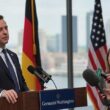A significant degree of ambiguity surrounds the projected investment expenditures outlined in Germany’s 2026 federal budget, according to a recent analysis by the Ifo Institute. While the budget allocates €56.1 billion under the “Investments” category – a decrease from the €62.7 billion earmarked for 2025 – a substantial portion of this figure is comprised of spending items whose true investment character is questionable.
Emilie Höslinger, a researcher at the Ifo Institute, argues that many of the allocations labeled as investments are, in reality, “disguised subsidies” rather than productive, future-oriented spending. The analysis reveals that among the ten largest investment posts, totaling €24.4 billion and representing 43.1% of total investment spending, numerous items lack a direct link to infrastructure development or maintenance. These include a significant €7.6 billion in loans to social security institutions and a further €6.85 billion allocated to international aid, guarantees and compensation programs.
A closer examination reveals that only roughly €5.8 billion of these top ten investment posts is directly channeled into critical infrastructure projects such as highways and railways. A mere €2.65 billion is designated for social housing construction, while a further €1.5 billion is classified as “provisional expenditure remainder investments” – a budgetary technique used to inflate the investment ratio through the carryover of unspent funds from prior years.
The decline in traditional construction investments highlights a concerning trend: the federal government increasingly relies on exceptional factors to inflate its investment statistics. Prior to the pandemic, infrastructure projects accounted for approximately 20% of all investment spending; this figure has plummeted to around 10% in both 2025 and 2026.
Conversely, there’s a marked increase in credit-financed expenditures exempted from Germany’s debt brake, including loans to social security organizations and the national railway company Deutsche Bahn. Höslinger points to the obfuscation created by over 700 vaguely defined budget lines, emphasizing that this distortion of data compromises a transparent and honest discussion regarding the long-term viability of Germany’s public finances. The analysis strongly suggests a need for comprehensive budgetary reform to ensure clarity and accountability in public investment strategies.





